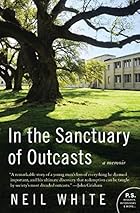 On the surface, Neil White had it all: charming himself with a beauty queen wife, two adorable children, enviable material possessions, owning a successful magazine. But underneath the perfect, wealthy veneer, White was borrowing from Peter to pay Paul. In fact, he was living well beyond his means and was loathe to change his habits so he started kiting checks, courting investors for infusions into the magazine, all while continuing to present an unruffled and untroubled facade to the outside world. But eventually he was caught, convicted of bank fraud, and sentenced to 18 months in a low security prison.
On the surface, Neil White had it all: charming himself with a beauty queen wife, two adorable children, enviable material possessions, owning a successful magazine. But underneath the perfect, wealthy veneer, White was borrowing from Peter to pay Paul. In fact, he was living well beyond his means and was loathe to change his habits so he started kiting checks, courting investors for infusions into the magazine, all while continuing to present an unruffled and untroubled facade to the outside world. But eventually he was caught, convicted of bank fraud, and sentenced to 18 months in a low security prison.The prison he was sent to was not just any prison though, it was the Federal Medical Center in Carville, Louisiana, an isolated federal prison that also functioned as our national leprosarium and housed some of the last leprosy patients in this country to be isolated and confined because of their disease. The 130 patients lived on one side and the several hundred inmates lived on the other. Their close proximity allowed for one of the most unique prison situations in the country. Patients and prisoners, an ancient order of nuns, health care workers, and prison guards and officials all lived, ate, slept, worshipped and worked cheek by jowl, if a bit uneasily, in this beautiful, serene looking setting.
White was a superficial man, concerned with the appearance of things rather than what was right. He was more worried that people would know that his business was struggling than he was about asking people, including his mother, to pour their life savings into his crumbling enterprise. The first time that he was caught kiting checks, his public persona allowed him to bury the incident and relocate to another city where his misdeeds were unknown and where he would, without guilt, engage in exactly the same behaviour as previously. He seemed to believe that he was a shining star and as such was owed success. Getting caught a second time didn't change his entitlement attitude at all or his overwhelming concern for his image, personally or publically. And this same concern and belief that he was above everyone around him carried with him into prison. Initially horrified that he was going to come into close proximity with the patients (what if he was to contract Hansen's disease too?), he decided that his stay in prison would provide fodder for a book. And obviously it has, if not entirely the way he initially thought.
As White put in his time at Carville, he had to start facing who he was under the skin, learning that appearances mean very little, a truth driven home in this place of refuge and sanctuary for the victims of such a disfiguring disease as Hansen's can be. He meets and becomes friends with an assortment of people from patients to other inmates and he learns from each them as he goes through his sentence. The patients are represented as wise and thoughtful, especially one elderly woman in particular, perhaps because of their long isolation from the greater population. The inmates are a more varied lot, ranging from diabolically genius to narrow-minded and prejudiced. White's focus is more on his personal journey and evolution than on anything else though so the reader follows along as he faces the disintegration of his marriage, his unabating ache to see and hold his children, and the dawning realization that the actions that landed him in prison were not in fact victimless as he had blithely convinced himself in his miasma of selfishness.
The stories of the inmates and the patients were interesting but they weren't nearly as in depth as could have been hoped. And the history of Carville itself was very superficially handled. This is primarily White's story and ostensibly the story of his redemption and change from selfish and self-important to aware and grappling with his own weaknesses. It's a very readable book but as an inspirational memoir, it falls a bit short as there is no real indication of White's evolution into a better, less image conscious, more thoughtful himan being. Not quite as comprehensive about the place and the people who populated it in its final years of operation as billed, this is still a quick and interesting book and an inside look at all we can learn from those we first dismiss.



This is a fascinating premise for a novel -- I wish the experience at Carville had been handled in a bit more depth. By the way, I love the title.
ReplyDeleteI agree with you completely. This book had a fascinating concept, decent writing, but too little self-awareness. Orange is the New Black was much better as a prison memoir (sans the Hansen's disease.)
ReplyDeleteI read this book but honestly cannot remember anything about it. I don't even recognize it as I am reading your review. I guess it was pretty unremarkable, huh?
ReplyDelete